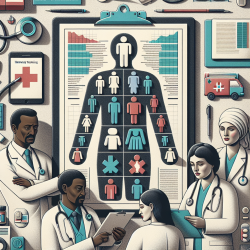Introduction to Collaborative AI in Healthcare
The rapid development of artificial intelligence (AI) in healthcare is reshaping how practitioners approach patient care. A recent study from Northwestern University titled "Northwestern University resource and education development initiatives to advance collaborative artificial intelligence across the learning health system" highlights the importance of cultivating a multidisciplinary workforce to maximize the synergy among various teams in healthcare. This blog will explore how practitioners, especially those involved in online therapy services like TinyEYE, can enhance their skills by implementing the outcomes of this research.
Key Findings from the Research
The research conducted by Northwestern University focuses on the integration of AI into healthcare systems, emphasizing the importance of collaboration between clinicians and AI scientists. Key outcomes from the study include:
- Development of data, tools, and educational resources to support a multidisciplinary workforce.
- Creation of natural language processing pipelines to extract structured information from clinical notes.
- Introduction of multimodal AI/machine learning tools and tutorials to analyze healthcare data.
- Establishment of the Center for Collaborative AI in Healthcare to institutionalize these efforts.
Implementing Research Outcomes in Practice
For practitioners, especially those providing online therapy services to schools, implementing these research outcomes can significantly enhance service delivery and outcomes for children. Here are a few ways to incorporate these findings:
- Utilize AI Tools: Leverage AI and machine learning tools to analyze patient data more effectively. This can help in tailoring therapy sessions to individual needs, improving the overall effectiveness of the therapy.
- Collaborate Across Disciplines: Engage with AI specialists to understand how AI can be integrated into your practice. This collaboration can lead to innovative solutions that enhance therapy outcomes.
- Invest in Education: Take advantage of educational resources developed by institutions like Northwestern University to stay updated on the latest AI advancements in healthcare.
Encouraging Further Research
While the research from Northwestern University provides a strong foundation, there is always room for further exploration. Practitioners are encouraged to delve deeper into the field of AI in healthcare to uncover new ways to enhance their practice. By staying informed and involved in ongoing research, practitioners can contribute to the evolution of healthcare delivery systems.
Conclusion
Incorporating AI into healthcare practices, particularly in online therapy services, offers immense potential for improving outcomes for children. By embracing collaborative AI and engaging in continuous learning, practitioners can stay at the forefront of healthcare innovation. To read the original research paper, please follow this link: Northwestern University resource and education development initiatives to advance collaborative artificial intelligence across the learning health system.










